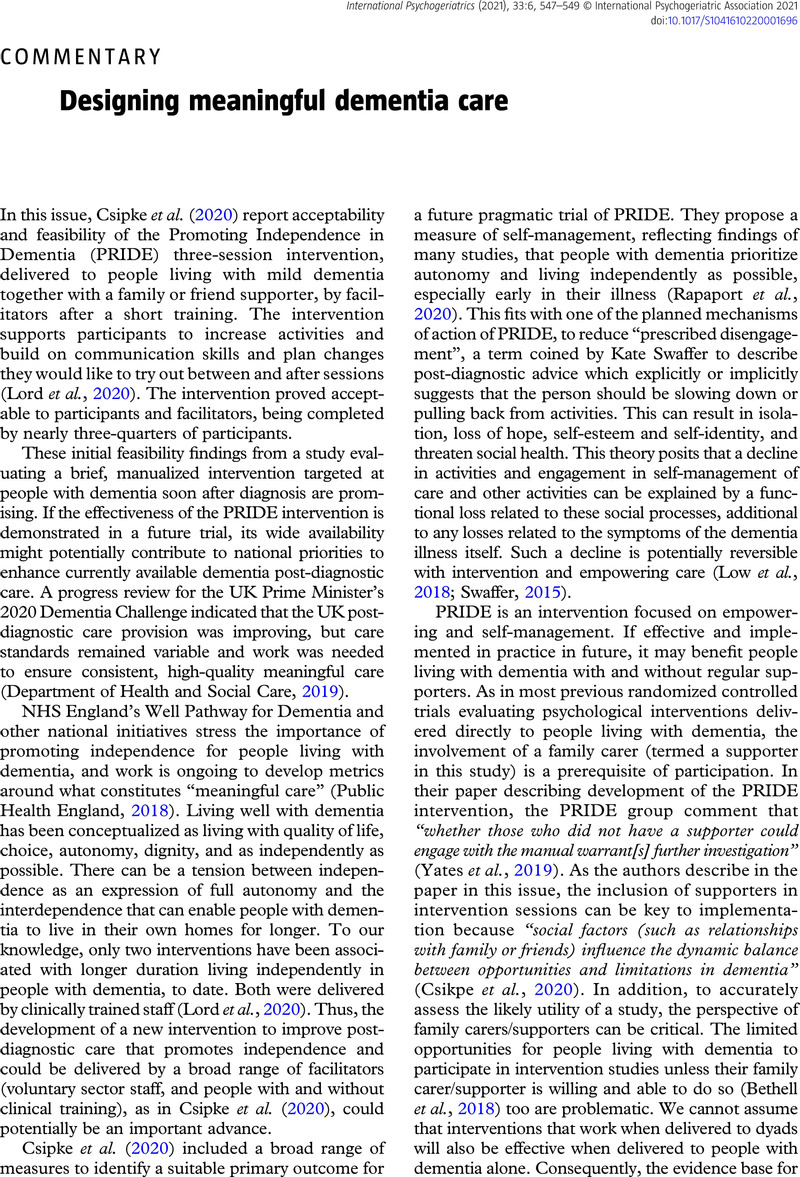No CrossRef data available.
Article contents
Designing meaningful dementia care
Published online by Cambridge University Press: 04 June 2021
Abstract
An abstract is not available for this content so a preview has been provided. Please use the Get access link above for information on how to access this content.

- Type
- Commentary
- Information
- International Psychogeriatrics , Volume 33 , Special Issue 6: Issue Theme: Diverse Strategies for Improving Seniors’ Well-Being , June 2021 , pp. 547 - 549
- Copyright
- © International Psychogeriatric Association 2021
References
Bethell, J. et al. (2018). Patient engagement in research related to dementia: a scoping review. Dementia (London), 17(8), 944–975.CrossRefGoogle ScholarPubMed
Care Department of Health and Social Care. (2019). Dementia 2020 Challenge: 2018 Review Phase 1. GOV.UK: London.Google Scholar
Cooper, C., Ketley, D. and Livingston, G. (2014). Systematic review and meta-analysis to estimate potential recruitment to dementia intervention studies. International Journal of Geriatric Psychiatry, 29(5), 515–525.CrossRefGoogle ScholarPubMed
Csikpe, E. et al. (2020). Feasibility and acceptability evaluation of the PRIDE (Promoting Independence in Dementia) intervention for living well with dementia. International Psychogeriatrics. doi: 10.1017/S1041610220001386
CrossRefGoogle Scholar
Eades, M., Lord, K. and Cooper, C. (2018). ‘Festival in a Box’: development and qualitative evaluation of an outreach programme to engage socially isolated people with dementia. Dementia (London), 17(7), 896–908.CrossRefGoogle Scholar
Livingston, G. et al. (2019). DREAMS-START (Dementia RElAted Manual for Sleep; STrAtegies for RelaTives) for people with dementia and sleep disturbances: a single-blind feasibility and acceptability randomized controlled trial. International Psychogeriatrics, 31(2), 251–265.CrossRefGoogle ScholarPubMed
Lord, K., et al. (2020). Developing the New Interventions for independence in Dementia Study (NIDUS) theoretical model for supporting people to live well with dementia at home for longer: a systematic review of theoretical models and Randomised Controlled Trial evidence. Social Psychiatry and Psychiatric Epidemiology, 55(1), 1–14.CrossRefGoogle ScholarPubMed
Low, L. F., Swaffer, K., McGrath, M. and Brodaty, H. (2018). Do people with early stage dementia experience Prescribed Disengagement(R)? A systematic review of qualitative studies. International Psychogeriatrics, 30(6), 807–831.CrossRefGoogle ScholarPubMed
Public Health England. (2018). Dementia: Applying All Our Health. Public Health England: London.Google Scholar
Rapaport, P. et al. (2020). “I just keep thinking that I don’t want to rely on people.” a qualitative study of how people living with dementia achieve and maintain independence at home: stakeholder perspectives. BMC Geriatrics, 20(1), 5.CrossRefGoogle ScholarPubMed
Shafayat, A. et al. (2019). Promoting Independence in Dementia (PRIDE): protocol for a feasibility randomised controlled trial. Trials, 20(1), 709.CrossRefGoogle ScholarPubMed
Swaffer, K. (2015). Dementia and Prescribed Dis-engagement. Dementia (London), 14(1), 3–6.CrossRefGoogle ScholarPubMed
Yates, L. et al. (2019). The development of the Promoting Independence in Dementia (PRIDE) intervention to enhance independence in dementia. Clinical Interventions in Aging, 14, 1615–1630.CrossRefGoogle ScholarPubMed




